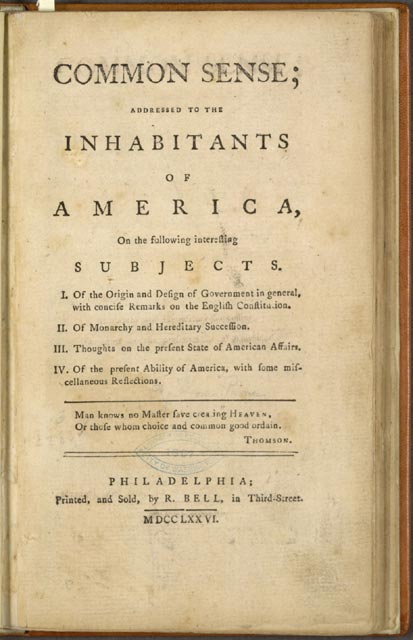
©
Copyright 2007 New Jersey Newspaper Foundation.
All Rights Reserved.
Click here
for a PDF version of Chapter 1
Chapter 1 - Common Sense
Arrives
It was a chilly January day in 1776, the cold
wind biting into the raw cotton coats and
leggings of two men as they strolled down Front
Street in Philadelphia.
John Weiss and Horace Blau
were their names.
Like many of the others
walking on the street that day, they were
laborers brought into the growing city to make
some sort of wage to support their families. Each
one waved a thin paper pamphlet wildly in the
face of the other.
Talking quickly back and
forth, they could hardly hear what each other was
saying because of the winter wind.
 "Horace, have you read these
pages called Common Sense?" John
exclaimed. "I think this is great! What do
you think?" "Horace, have you read these
pages called Common Sense?" John
exclaimed. "I think this is great! What do
you think?"
"Yes, yes, John. This
is an enlightening message," Horace replied.
"We should break with that island 'cross the
water. We should. We must be free of English
rule."
Before they spoke further,
another excited man joined them. Walter Schwartz
also carried a copy of Common Sense and
waved it like a flag over his head.
"Gentlemen, gentlemen,
how are you today? Horace, I have not seen you
much lately. I see you have a copy of the same
work that I have," he said, gesturing toward
the wrinkled papers he carried. "There is
revelation in these papers, I swear. But, but,
who is this 'Anonymous' who gave us this work?
Who wrote these enlightening words?"
"Hello, Cousin Walter,
it has been awhile since you have come to town
from your farm," Horace responded, folding
his hands under his coat to warm them. "Good
day, and how is it with the family?"
"Good, good; and good
with family," Walter said. "But who ...
who, my cousin, wrote this Common Sense
?"
Horace replied," He
calls himself an Englishman."
"Ah, this Englishman
wrote something good. I raise to him a toast,
this Mister Englishman," Walter said.
"I'll give this to my son, Rudolph. He will
read it all and then give it to his neighbor,
Wilhelm. I got my copy from John Aitken's young
son who sold it to me back there on the street
corner, and I started to read it right
away."
Common Sense was
already becoming an uncommon hit in a city known
for its fresh broadsheets that came from the
small press of the well-known journalist and
publisher, Benjamin Franklin.
But who was the author? Who
was this Englishman?
"I think it must be Dr.
Franklin himself, " Horace said.
"Oh,
no," said John. "I do not think so for
this. Maybe it's Dr. Benjamin Rush. He has such a
mind."
"No. Maybe
it was those firebrands from Boston. Those Adams
men, John or Samuel?" asked Horace.
* * *
None of those
men wrote Common Sense.
The author was actually a
new immigrant, an Englishmen who arrived in
Philadelphia just 14 months earlier, on November
30, 1774.
He came with no family.
No friends to stay with.
No house. Not much money. No
job.
Yet, within the first 100
days of its printing "each page laboriously
printed separately on heavy iron presses." Common
Sense, the words of an unknown writer, had
become the same as a modern-day best
seller.
In the towns and farms
across the 13 colonies, the story spread. More
than 120,000 copies were printed, sold, borrowed,
or traded. The words were talked about and
memorized.
This is the story of Thomas
Paine, the uncommon man who wrote Common
Sense.
(check
out a few excerpts of Common Sense)
Return to the Table of Contents
|




